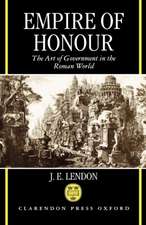The Fascist Party and Popular Opinion in Mussolini's Italy
Autor Paul Corneren Limba Engleză Paperback – 12 oct 2021
| Toate formatele și edițiile | Preț | Express |
|---|---|---|
| Paperback (1) | 248.02 lei 10-16 zile | |
| OUP OXFORD – 12 oct 2021 | 248.02 lei 10-16 zile | |
| Hardback (1) | 921.98 lei 31-37 zile | |
| OUP OXFORD – 19 iul 2012 | 921.98 lei 31-37 zile |
Preț: 248.02 lei
Preț vechi: 270.53 lei
-8% Nou
Puncte Express: 372
Preț estimativ în valută:
47.46€ • 49.65$ • 39.42£
47.46€ • 49.65$ • 39.42£
Carte disponibilă
Livrare economică 01-07 martie
Preluare comenzi: 021 569.72.76
Specificații
ISBN-13: 9780192855787
ISBN-10: 0192855786
Pagini: 320
Dimensiuni: 155 x 234 x 17 mm
Greutate: 0.49 kg
Editura: OUP OXFORD
Colecția OUP Oxford
Locul publicării:Oxford, United Kingdom
ISBN-10: 0192855786
Pagini: 320
Dimensiuni: 155 x 234 x 17 mm
Greutate: 0.49 kg
Editura: OUP OXFORD
Colecția OUP Oxford
Locul publicării:Oxford, United Kingdom
Recenzii
a seminal study
[an] informative and well-researched book
excellent, well-sourced and well-argued
Paul Corner's [book is a] stimulating, powerfully argued and important new study of the relationship between the fascist party and popular opinion in inter-war Italy.
This is an utterly convincing account that will contribute to a better understanding of Italians' daily life during the ventennio. No doubt Corner's impressive academic work will be of interest not only to scholars of Italian fascism, but also to those who want to analyse the experience of ordinary people under any form of dictatorship.
Paul Corner's new book, however, acts as a major corrective to what might almost have seemed an established view. Based on meticulous social-historical research ... Corner depicts a regime with a yawning gap between what it claimed about itself and its presence in the lives of its subjects ... Corner's monograph must become the basis of all future reading on this dictatorship.
The richness of its documentary sources, the breadth of its territorial coverage, and the rigor of its analysis make this book an invaluable addition to the historical scholarship on Italian fascism as it existed and was experienced at the provincial level.
If a study deserves exuberant praise from Richard Evans, it is ... Paul Corner's investigation of fascism in the provinces.
[an] informative and well-researched book
excellent, well-sourced and well-argued
Paul Corner's [book is a] stimulating, powerfully argued and important new study of the relationship between the fascist party and popular opinion in inter-war Italy.
This is an utterly convincing account that will contribute to a better understanding of Italians' daily life during the ventennio. No doubt Corner's impressive academic work will be of interest not only to scholars of Italian fascism, but also to those who want to analyse the experience of ordinary people under any form of dictatorship.
Paul Corner's new book, however, acts as a major corrective to what might almost have seemed an established view. Based on meticulous social-historical research ... Corner depicts a regime with a yawning gap between what it claimed about itself and its presence in the lives of its subjects ... Corner's monograph must become the basis of all future reading on this dictatorship.
The richness of its documentary sources, the breadth of its territorial coverage, and the rigor of its analysis make this book an invaluable addition to the historical scholarship on Italian fascism as it existed and was experienced at the provincial level.
If a study deserves exuberant praise from Richard Evans, it is ... Paul Corner's investigation of fascism in the provinces.
Notă biografică
Educated at the universities of Cambridge and Oxford, Paul Corner has taught in Borneo, England, and Italy. He was research fellow at St. Antony's College, Oxford, then Director of the Centre for the Advanced Study of Italian Society at the University of Reading, and - since 1987 - has been Professor of European History at the University of Siena in Italy where he is also Director of the Centre for the Study of Totalitarian Regimes. Author of many publications relating to Italian Fascism and to totalitarianism in general, he has lectured widely on the subject in both Europe and America.
















